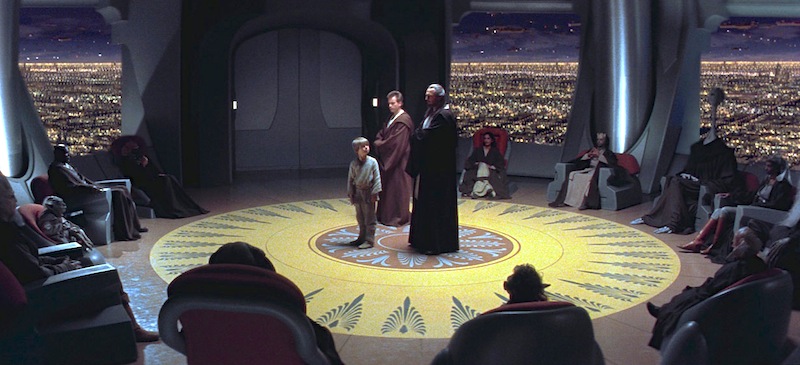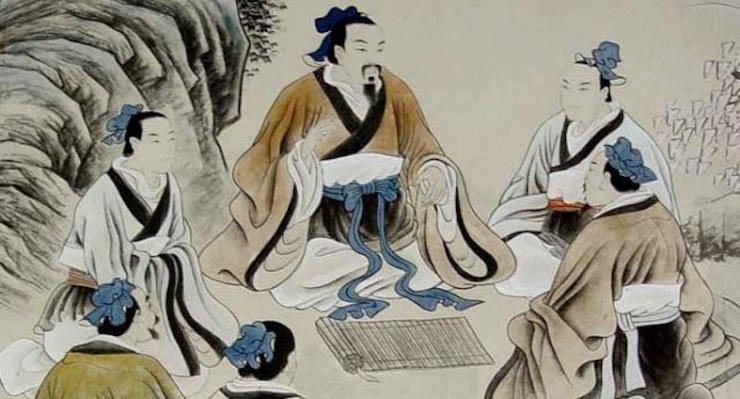Sit down, because I’m going to tell you about, objectively speaking, the best philosophical movement in history.
If you’re saying “what gives, Max, this is a little looser than your usual style,” well, I delivered two books last month, and this month I have a game to write and page proofs to approve and two short stories due, so y’all get Philosophy Story Time.
DISCLAIMER: Being of fractured mind and atrophying body, I’m not cite-checking this blog post. This is my “off the top of my head” survey of Mohism, the Warring States Period, etc., which is pretty solid, but if you base a paper on this, on your own head be the fault.
Most of Chinese philosophy’s core strains come from a time called the Warring States period, which lasted for about two hundred fifty years and started about 2,500 years ago. You know that bit at the beginning of Star Wars where the crawl says “It is a time of CIVIL WAR”? That’s the Warring States era. Basically the Western Zhou, the dynasty which sort of ruled a decent chunk of the land we now call China, split into hundreds of tiny city-states, and they all slammed against one another at high velocity until they glommed into eight larger kingdoms that then, well, warred.
Everyone was warring with everyone all the time, and life sucked.
And since everyone was warring with everyone all the time, and life sucked, people started asking: why does life suck so much? Does it have to? Could we stop life from sucking?
So they became philosophers.
Philosophy has a bad rap these days for being the discipline of bearded folk sitting around arguing with other bearded folk about how they know they’re really bearded folk sitting around arguing, because after all doesn’t that statement (“we are bearded folk arguing”) involves all sorts of unexamined assumptions about knowledge and existence (and what sort of existence, anyway?), how do I know that what you mean by ‘bearded’ is the same as what I mean by ‘bearded,’ etc. All of which gives philosophy a bit of an ‘Oh, so what are you going to do with that degree’ vibe around modern college campuses.
(Except among philosophers, who don’t care what you think.)
Thing is, while we don’t tend to think of it this way, philosophy is a technology—philosophers develop new modes of thinking, new ways of organizing the state, new ethical principles, and so on. Wartime encourages rulers to invest in Research and Development. So in the Warring States period, a lot of philosophers found work in local courts, as a sort of mental R&D department.
Scoff if you want, but this approach worked. (Hell, it even worked in the West, when Western countries remembered not to execute their philosophers—think Aristotle and Alexander.) The Legalists, who (massive oversimplification here) you wouldn’t be far from the truth in calling “Evil Daoists,” formed the bureaucratic and ideological tech that let Qin Shihuang, the First Emperor (sort of), field armies of one million (that’s million) soldiers two hundred seventy years before Christ. Confucius spent much of his time getting fired from various official posts and trying to convince rulers to listen to him (autarchical rule from behind the Veil of Ignorance, which is sort of the Legalist position, is an easier sell to absolute monarchs than Confucian mutual responsibility), but he had the last laugh in the long run when his teachings became the core of Imperial thought for two thousand years.
Anyway, this is all getting away from The Best Philosophy, so let’s tack in that direction.
Warring States philosophy has a lot of weird things going for it. Philosophers seem to have had a decent amount of influence (or people with influence liked calling themselves philosophers), for starters. Another weirdness, from a Western perspective, is that Warring States philosophy uses a range of argumentative strategies, some of which don’t look like argument at all in the strict rhetorical-logical sense you’ll see in Western philosophy.
For example: Zhuangzi’s philosophy relies on storytelling, wordplay, and paradox. You want Zhuangzi to set down and define his terms? He’ll laugh in your face, because (a) your terms are linguistic artifacts without any inherent access or correspondence to truth, which, what is that anyway, and (b) he’s really drunk right now, come back tomorrow. The texts attributed to Confucius range all over the map; the core work, the Analects, is a collection of sayings—not a dialogue, just things Confucius, who was a specific guy, said to specific people at specific times. Discussion of the Analects feels a lot like discussion of a gospel passage sometimes: here’s a story told to a specific person in a specific situation. Who was that person? What was that situation? What can we learn from them?
Enter The Best Philosopher. Mo Di—who I’ll call Mozi for the rest of this story because he’s remembered under that name—used a rhetorical style closer to Western philosophy: lots of propositional logic and contradiction-ferreting, lots of “if A, then B.” This isn’t why he’s the best.
He taught a philosophy of Universal Love, as in, Love everyone in the Universe Equally. He justified the need for this love to be Universal with logic which I’d be hard-pressed to reconstruct off the top of my head, but goes something like this:
- Violence and war spring from partiality (liking My Team more than Your Team)
- There’s no division in kind between small partiality and large partiality—and small partiality can become large partiality under sufficient force, or for no reason at all (e.g. the Prison Experiment)
- So the big problem appears to be partiality of any sort.
- In order to achieve universal peace, we must eliminate partiality.
- So, we must all love one another or die. (w/ apologies to Auden)
There are, I’m sure, steps in there I’ve missed.
Mozi was a debating rock star. He was the KRS-One of philosophy debates in his day, because he’d use his propositional logic to codify his opponent’s position, then break it to pieces. People refused to debate him after a while. That’s cool, but that’s not why he’s the best.
See, there’s a problem with believing in Universal Love and Peace during, ah, the Warring States Period. Do you see it yet?
It has to do with the name.
It’s hard to love someone when you’re fighting them, so Mozi wanted fighting to stop. (Also if you want to get down into the nitty-gritty of ethics, Mozi believed that a government’s duty was to ensure its people had safety, food, and shelter—none of which involves going out and depriving other folks of their safety, food, and shelter.) But how do you stop war?
Standard answers: preach peace, sing-ins, kumbayah, banjos, tie-dyed shirts, levitate the Pentagon.
Mozi’s answer: you make war impossible.
How do you make war impossible?
You make it impossible for any nation to attack any other.
How do you do that?
If you’re Mozi:
- You train your legions of devoted followers into experts in defensive siege warfare.
- You study the military technology of your day and figure out how to defeat each weapon—and then you teach your followers.
- You teach them how to detect people tunneling under city walls.
- You teach them how to respond to a zergling rush. (An “ant rush” in the literature, but, same basic deal.)
- You teach them how to see through misleading formations.
- You teach them how to detect spies.
- You teach them how to read an army from its smoke and dust.
And once your followers are trained, you send them to any city under attack, gratis. City A attacks city B? Send your followers to City B. When City B counterattacks City A next season? You send your followers to City A.
So, basically—
Universal love.
Gnomic pronouncements.
Badass army-defying antics.
Mozi founded the Jedi Knights.

Hence: Best philosopher.
I see you scoffing, there on the other side of your internet. But it turns out the writings of Mozi are the best source about contemporary siege warfare tactics. This guy, and his followers, knew his stuff.
If I wrote this in a fantasy novel, I guarantee you people out there would call bullshit. But history’s an awesome place, if you look.
Also, dibs on that novel. Once I’m done with the, you know, game and the other novels and the et cetera…
This article was originally published in February 2015.
 Max Gladstone has been thrown from a horse in Mongolia, drank almond milk with monks on Wudang Shan, and wrecked a bicycle in Angkor Wat. Max is also the author of the Craft Sequence of books about undead gods and skeletal law wizards—the latest installment, Ruin of Angels, is available September 5th from Tor.com Publishing. You can follow him on Twitter.
Max Gladstone has been thrown from a horse in Mongolia, drank almond milk with monks on Wudang Shan, and wrecked a bicycle in Angkor Wat. Max is also the author of the Craft Sequence of books about undead gods and skeletal law wizards—the latest installment, Ruin of Angels, is available September 5th from Tor.com Publishing. You can follow him on Twitter.










